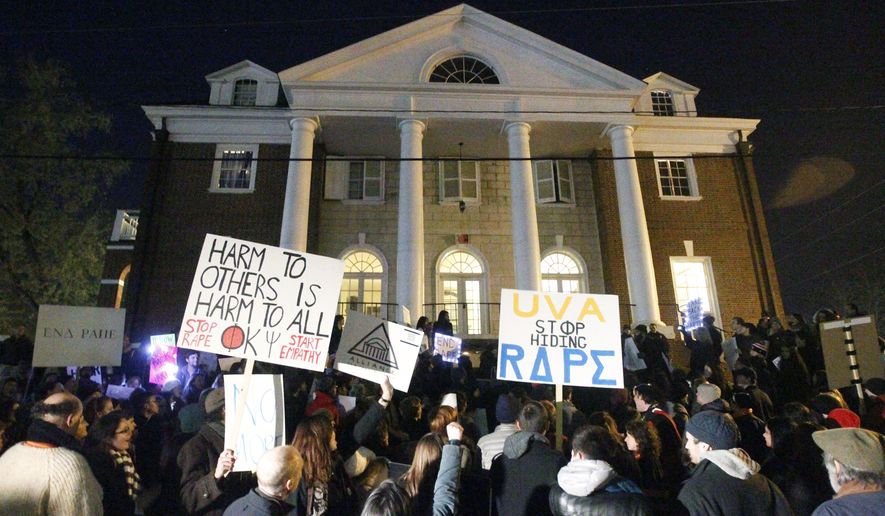Accusations of a brutal gang rape at a University of Virginia fraternity party crumbled over the weekend, after Rolling Stone magazine publicly backed away from its reporting and then quietly revised its own apology amid further outcry.
The magazine’s editors in a note to readers admitted Friday that their trust in the source for the article documenting the incident at the Charlottesville school was “misplaced,” following widespread speculation about the story’s credibility.
Managing Editor Will Dana apologized for “discrepancies” in the story of the accuser, who went by the pseudonym “Jackie,” that were exposed by The Washington Post and other organizations after the explosive report drew national attention.
“In the face of new information, there now appear to be discrepancies in Jackie’s account, and we have come to the conclusion that our trust in her was misplaced,” Mr. Dana wrote.
Soon after, the statement on the magazine’s website was quietly altered amid criticism that it appeared to be blaming the victim instead of the reporter for, among other things, not seeking fair comment from the men who were said to have been involved.
“We have come to the conclusion that we were mistaken in honoring Jackie’s request to not contact the alleged assaulters to get their account,” the editor’s note was made to read. “These mistakes are on Rolling Stone, not on Jackie.”
Virginia Attorney General Mark R. Herring, a Democrat, had called Rolling Stone’s initial apology “deeply troubling,” saying the magazine should do more to clear up the report’s mistakes.
Mr. Herring, chairman of the Governor’s Task Force on Combating Campus Sexual Violence, also stressed that the faulty account would do nothing to hinder state and campus efforts to fight sexual assault on campus.
The report contained the account of a 2012 attack in which a woman claimed to have been raped by seven men at the Phi Kappa Psi fraternity house.
The article also focused on the university’s botched response to the allegations, and prompted fierce backlash from alumni and students.
U.Va. President Teresa A. Sullivan called for a full investigation and suspended all social fraternity activity until Jan. 9, and Virginia Gov. Terry McAuliffe said he was “deeply disturbed” by the article.
The Rolling Stone statement came as the fraternity at the center of the allegation, Phi Kappa Psi, issued a statement rebutting the account, saying it did not hold any social events at the frat house on the date of the reported rape and none of its members were working as lifeguards at the time — a description given of one of the perpetrators in the magazine article.
“Our initial doubts as to the accuracy of the article have only been strengthened as alumni and undergraduate members have delved deeper,” the fraternity statement said.
• Kellan Howell can be reached at khowell@washingtontimes.com.
• Andrea Noble can be reached at anoble@washingtontimes.com.




Please read our comment policy before commenting.